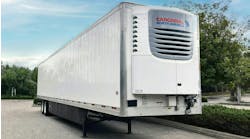Florida East Coast Railway (FECR) is celebrating its first-year anniversary operating its new Intermodal Container Transfer Facility (ICTF) adjacent to Port Everglades with a 26% increase in volume, according to James R Hertwig, FECR president and chief executive officer.
“This is a terrific milestone that validates the investment made by FECR, Port Everglades, the state of Florida, and Broward County—one that will have long-lasting benefits for the community by reducing road congestion and greenhouse gas emissions,” said Hertwig. “We look forward to continued growth at the ICTF as the port adds new docks and cranes, and expands its harbor with deeper and wider channels.”
In a model public-private partnership, FECR built the ICTF on 43 acres provided by Broward County’s Port Everglades. The ICTF, which was completed in 18 months and opened in July 2014, is used to transfer international intermodal containers arriving or departing by ship—both north/south and east/west trade lanes—as well as domestic containers and trailers with cargo moving to and from South Florida.
Prior to the opening of this facility, such containers were transported by truck to and from Port Everglades to off-port rail terminals in Fort Lauderdale and Hialeah.
Cargo moves through Port Everglades to/from Atlanta GA and Charlotte NC in two days, and Nashville TN and Memphis TN in three days. FECR’s direct connection to the nation’s Class 1 rail network allows for service to 70% of the US population within four days.
Having empty 53-foot domestic containers and trailers adjacent to the port provides more opportunities to trans-load import cargo from ocean containers to domestic containers for inland rail transport. This results in more domestic containers moving north as loads, instead of empties, increasing the efficiency of the intermodal network.
The ICTF is expected to reduce congestion on Interstate highways and local roadways because loading and offloading cargo will take place at the port as opposed to offsite facilities. As a result, air emissions will be reduced by diverting an estimated 180,000 trucks from the roads by 2027.
Access www.fecrwy.com or www.porteverglades.net for complete information.

Voice your opinion!
Voice your opinion!
To join the conversation, and become an exclusive member of FleetOwner, create an account today!
Latest from Reefer Operations
Latest from Reefer Operations


